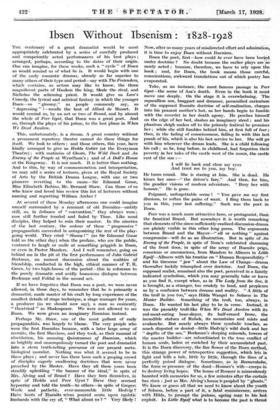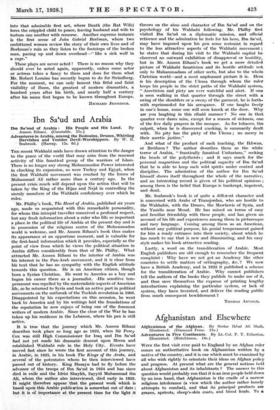Ibsen Without Ibsenism : 1828-1928
THE centenary of a great dramatist would be most appropriately celebrated by a series of carefully produced and competently acted performances Of his best plays ; arranged, perhaps, according to the dates of their origin. One can imagine, for these weeks, such a " cycle " of Ibsen as Would remind us- of what he is. It would begin with one of the early - romantic dramas, already so far superior to Many others of their type and period—say with The Pretenders, which contains, as actors may like to know, the three magnificent parts of Haakon the king, Skule the rival, and Nicholas the scheming priest. It would give us Love's Comedy, the lyrical and satirical fantasy in which the younger Ibsen—so "gloomy," as people commonly say, . so " depressing " !--recalls the best of Alfred de Musset. It would remind us, by an act or two of Brand, and by almost the whole of Peer Gynt, that Ibsen was a great poet. And so, through the plays of his prime, to the last phase in When We Dead Awaken.
This, unfortunately, is a dream. A great country without a permanent repertory theatre cannot do these things for itself. We look to others ; and those others, this year, have kindly arranged to give us Hedda Gabler (at the Everyman Theatre) ; with matinees of Ghosts, The Wild Duck and An Enemy of the People at Wyndham's ; and of A Doll's House at the Kingsway. it is not much. It is better than nothing. And to this, by way of commemoration and interpretation, we may add a series of lectures, given at the Royal Society of Arts by the British Drama League, with one or two pioneers reverting to the cause—Sir Edmund Gosse, Miss Elizabeth Robins, Mr. Bernard Shaw. Can those of us who knew and loved him review this list of lecturers without naming and regretting William Archer ?
At several of these Monday afternoons one could imagine oneself surrounded by a remnant of old Ibsenites—untidy still, as, in defiance of "convention," they always were; now still further touzled and faded by Time. Lae most disciples, they helped to ruin their master. In the nineties of the last century, the ardour of these " progressive " propagandists succeeded in antagonizing the rest of the play- going world. They cried " Shame !" (as Sir Edmund Gosse told us the other day) when the profane, who are the public, ventured to laugh or smile at something priggish in Ibsen, or even in Pastor Manders. ; And I well remember, going on behind me in the pit at the first performance of John Gabriel Berkman, an earnest discussion about the realities of friendship, conducted in the high, ethical manner of T. H. Green, by two high-brows of the period—this- in reference to the purely dramatic and acidly humorous dialogue between
Borkman and Foldal in the second act. , ..... _ If we have forgottea that Ibsen was a poet, we were never allowed, in those days, to remember that he is primarily a dramatist, made master of his craft by long experience of the smallest details of stage technique, a stage manager for years, a producer (as we should now say), a man as eminently " theatrical " as Shakespeare. We were not allowed to see Ibsen. We were given an imaginary lbsenism instead.
Perhaps Mr. Shaw, one of the most gallant of early propagandists, was largely to -blame. The very people who were the first Ibsenites became, with a later large army of recruits, the first Shavians, and they took, as their manual of elucidation, his amusing Quintessence of lbsenism, which so brightly and unscrupulously turned the poet and dramatist into a stern truth-telling precursor of our present meta. biologicalmoralist. Nothing was what it seemed to be in these plays ; and never has there been such a gasping crowd or disciples eagerly swallowing doctrines that were never preached by the Master. Have they all these years been steadily upholding "the banner of the ideal," in spite of Mr's. Alving and of Brand ? Have they been themselves, in spite of Iredda and Peer Gynt ? have they scorned hypocrisy and told the truth—tO others—in spite of Gregers Werle and pathetic, ever-memorable Hedvig ? IIaic hoses- of -lire-mite wives poured scorn upon_ egoistic husbands with the cry of, "What about us ? " Very likely !
Now, after so many years of misdirected effort and admiration, it is time to enjoy Ibsen without lbsenism.
Ibsen the poet, first—how could he ever have been buried, under doctrine ? No doubt because the earlier plays are so rarely acted ; because, therefore, we have to rely upon the book ; and, for Ibsen, the book means those careful, conscientious, awkward translations out of which poetry_ has evaporated.
Take, as an instance, the most famous passage in Peer Gynt—the scene of Asa's death. Even in the book it must move one deeply. On the stage it is overwhelming. The rapscallion son, braggart and dreamer, personified caricature of the suppdsed lbsenite doctrine of self-realization, charges into his peasant mother's hut, as her hands begin to fumble with the coverlet in her death agony. He perches himself on the edge of her bed, slashes an imaginary steed ; and his phantom sleigh makes off to the princely festival he promises her ; while she still fumbles behind him, at first full of fear ; then, in the fading of consciousness, falling in with this last prank of his, which is also his last service to her. She will go with him wherever the dream leads. She is a child following his call ; as he, long before, in childhood, had forgotten their poverty in her tales of the castle west of the moon, the castle east of the sun :— I will lie back and close my 'eyes And trust me to 'you, My boy. . _ He turns round. She is staring at him. She is dead.. lie kisses her once—" the driver's fare." And then, for him, the gaudier visions of modern adventure. "Bury her with honour." He is gone.
Poignant, unforgettable scene ! "You gave me my, first illusions, to soften the pains of want. I fling them back to you in this, your last suffering." Such was the poet in Ibsen.
Peer was a much more attractive hero, or protagonist, than, the fanatical Brand. But nowadays it is worth remarking that elements of the since-sufficiently-realized discussion-drama are plainly visible in this other long poem. The arguments between Brand and the Mayor—" all or nothing" against compromise—will do as an illustration. But in spite of An Enemy of the People, in spite of Nora's celebrated slamming of the front door, in spite of the array of Ibsenite prigs, conscious or, unconscious, from Manders to Allmers in Little Eyolf—Allmers with his treatise on "Human Responsibility " and his tiresome " jaw " about the Law of Change—drama thereafter luckily triumphed over doctrine. And Ibsen, the supposed realist, remained also the poet, perceived in a faintly indicated symbolism, which you may generally take or leave as you find it, except when, as in The Lady from the Sea, it is brought, as a stranger, too crudely to land, and perplexes us by a confusion between dreams and reality. "A little of the troll in you too," says Hilda Wangel to Solness in The Master Builder. Something of the troll, too, always, in Ibsen. He wanted his last play to be in verse. Instead, it was the passably troll-like When We Dead Awaken with its red-meat-eating bear-slayer, its half-crazed Irene, the incredible statues of Rubek, its mountains and mists and avalanche. But nearly always these symbolic touches, so much disputed or denied—little Hedvig's wild duck and her "depths of the sea," Borkman's sleeping minerals, towers of the master builder—are subordinated to the true conflict of human souls, laden or enriched by their accumulated past. It is the Ibsen discovery, the fine flower of the Ibsen method, this strange power of retrospective suggestion, which lets in light and tells a tale, little by little, through the lines of a perfectly poised dialogue. Sometimes, as in Rosmershoim, the force or presence of the dead—Rosmer's wife—creeps in to destroy living hopes. The house of Rower is miraculously hatinted with memories for us, a few minutes after the curtain has risen ; just as Mrs. Alving's house is peopled by ghosts." We !Mow, or guess all that we need to know about the youth of Sdlness, before a part of it, a fatal reminiscence, arrives with Hilda, to prompt the jealous, ageing map to his Inst exploit. In Little E'yolf what is to become the past is thrust
into that admirable first act, where Death (the Rat Wife) lures the crippled child to peace, leaving husband and wife to torture one another with remorse. Another supreme instance is the first scene of John Gabriel Borkman, where two embittered women review the story of their own lives and of Borkxnan's ruin as they listen to the footsteps of the broken
man, pacing up and down overhead—" like a sick wolf in a ,age.,,
These plays are never acted ! There is no reason why they should ever be acted again, apparently, unless some actor or actress takes a fancy to them and does for them what Mr. Robert Loraine has recently begun to do for Strindberg. For the moment, we can only lament this fitful . and faint visibility of Ibsen, the greatest of modern dramatists, a hundred years after his birth, and nearly half a century after his name first began to be known throughout Europe.
RICHARD JENNINGS.











































 Previous page
Previous page